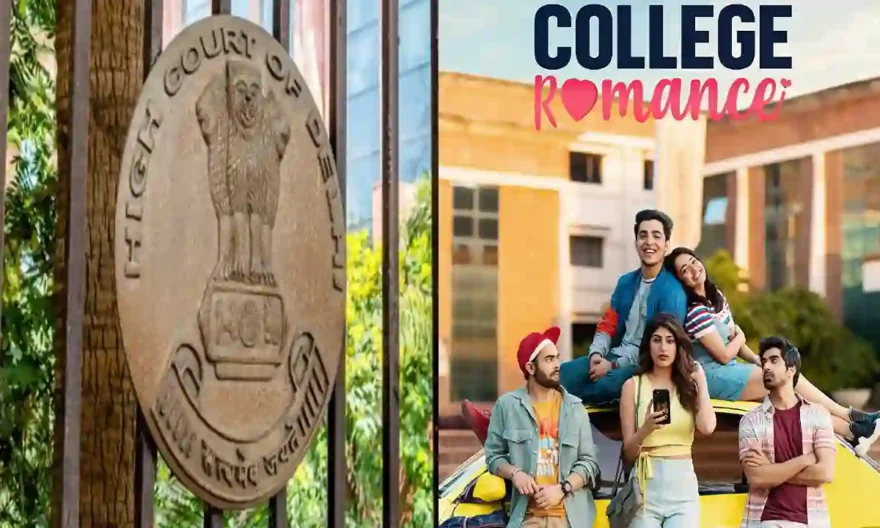
The Delhi High Court recently ruled that the language used in the TVF web series ‘College Romance’ is obscene, profane, and vulgar, and that it will deprave and corrupt the minds of young people.
Justice Swarana Kanta Sharma stated that she had to watch the episodes of the show with the help of earphones in the chamber because the profanity used could not have been heard without shocking or alarming the people around her.
“Certainly, this Court observes that this is not the language of the nation’s youth or other citizens of this country, and it cannot be called the most commonly spoken language in our country,” the judgement noted.
As a result, the single-judge ruled that TVF, the show’s director Simarpreet Singh, and actor Apoorva Arora face legal action under Sections 67 (publishing or transmitting lascivious material in electronic form) and 67A (punishment for publishing or transmitting material containing sexually explicit act) of the Information Technology (IT) Act.
Therefore, the Court upheld the Additional Chief Metropolitan Magistrate’s (ACMM) order directing Delhi Police to file a FIR against the three accused.
The ACMM court had ordered the police to file a FIR against TVF, Singh, and Arora under Sections 292 (sale or distribution of obscene books, pamphlets, paper, writing, drawing, painting, representation, figure, or any other object), 294 (punishment for obscene acts in public), and 67 and 67A of the IT Act.
In a detailed order, Justice Sharma stated that such language cannot be served to the general public and represented to the world as if it is the language spoken by this country and its youth in educational institutions in the name of individual freedom.
The bench stated that the language used in the show fails the morale, decency, and community test of a common man.
The Court was hearing the petitions filed by TVF, Singh, and Arora, who were challenging an order of the Additional Sessions Judge (ASJ) and the ACMM.
The ACMM had directed that FIRs be registered against the petitioner under Sections 292 and 294 of the IPC, as well as Sections 67 and 67A of the IT Act. The ASJ dismissed the IPC sections but ordered the police to register the FIR under the IT Act.
This was based on a complaint that vulgar and obscene language was used in Episode 5 of the show’s first season. It was claimed that not only was the episode’s title, ‘Happily Fucked Up,’ vulgar, but it also depicted indecent or obscene depictions of girls or women in their worst form.
The Court was told that the video in question is available for viewing on YouTube by anyone in India, with no age restrictions.
After considering the case and watching the show, Justice Sharma stated that the concept of morality varies from country to country and that courts should not look to the west or any other part of the world for guidance in this matter.
According to the judge, Indian morality and values can only be judged in the Indian context while keeping current civility and morality standards in mind.
Thus, the bench emphasised that, when the content of the web series is examined in light of the country’s contemporary moral and civil standards, it can be stated that the majority of Indians do not use such language and are offended and disgusted by the excessive profanity, vulgarity, and obscenity of the language used.
In her ruling, Justice Sharma referred to a scene in which the male protagonist, named ‘Bagga,’ uses foul language, which is later repeated by the female character.
According to the judge, “the bug of obscene, profane, and bad language of ‘Bagga’ cannot be allowed to pollute people’s language.”
Justice Sharma rejected the argument that the courts cannot cannot act as moral police and therefore, cannot impose choices on people.
“To accept the petitioners’ contention that hurling such obscenities in public forums and by the young generation in general, in universities and colleges, is so common that it is considered natural, without causing any distress, could imply that a certain standard of decency cannot be expected on streets, public places, or educational institutions. Such linguistic decay of the Hindi language will go beyond falling social standards, ” the court took notice.
She further added, “In this Court’s opinion, the use of profanity and words that are taboo in general parlance in the web series under the guise that this is how the new generation behaves, speaks, or communicates is not a mirror of such social realities and is certainly distorted. Though such web series may depict a specific segment of society, this country’s popular culture still identifies with and adopts civil language viewpoints.”
Justice Sharma concluded that the obscenity in the web series, combined with the fact that it is widely available, is sufficient to warrant criminal prosecution.
Therefore, she directed the police to file a FIR under Sections of the IPC and the IT Act.
The judge, however, clarified that the order to register a FIR does not include an order to arrest any of the accused/petitioners.
The Court also asked the Ministry of Electronics and Information Technology (MEITY) to take steps to ensure that its IT (Intermediary Guidelines and Digital Media Ethics Code) Rules, 2021, are strictly enforced.
In light of the observations made in this judgement, the Central Government was also asked to enact any laws or rules that it deemed appropriate in its wisdom.
“A copy of this judgement be forwarded to the Secretary, Ministry of Electronics and Information Technology, Government of India, and relevant YouTube India officials”, the Court ordered.





